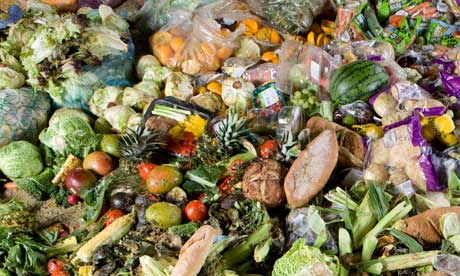Wed
06
Feb
2013
Overfishing Threatens Food Chain
Overfishing Threatens a Critical Link in the Food Chain
Surfrider Foundation soup@surfrider.org

The fish near the bottom of the food chain are often overlooked, but they are vital to healthy oceans and estuaries. Collectively known as forage fish, these species, including sardines, anchovies, herrings, and krill, feed on plankton and become food themselves for larger fish, seabirds, and marine mammals. But, as demand for animal protein has soared, more and more forage fish have been used to feed livestock and farmed fish. A growing body of scientific evidence suggests that current fishing levels are dangerously high, both for the forage fish themselves and for the predators and industries that depend on them.
Mon
28
Jan
2013
Almost Half of the World's Food is Thrown Away
 Rebecca Smithers, consumer affairs correspondent
Rebecca Smithers, consumer affairs correspondent

Between 30% and 50% or 1.2-2bn tonnes of food produced around the world never makes it on to a plate. Photograph: Murdo MacLeod for the Guardian
Sun
08
Apr
2012
Using Community Gardens to Grow Low-Income Communities Out of Food Deserts
Truthout
Saturday, 07 April 2012 13:03
By Emily Apple, New Deal 2.0
March 20th marked the third anniversary of the planting of the White House vegetable garden, the first functioning garden since Eleanor Roosevelt’s Victory Garden.
The garden is an essential part of Michelle Obama’s Let’s Move! initiative that aims to help raise a generation of
healthy, active kids. But while it provides an excellent jumping off point for discussing the importance of nutrition, it does not get to the root cause of the lack of nutrition across the
country. Not everyone can have an organic garden in his backyard or, on an even more basic level, a supermarket that sells quality fruits and vegetables. According to the United States Department of Agriculture, more than 23 million Americans live in “food deserts”: areas with limited access to affordable and
nutritious food, particularly ones composed of predominantly lower income neighborhoods and communities. Before we begin to talk about the problem of nutrition in our country, we must first
improve access to food for millions of Americans. And Michelle Obama is on the right path — community gardens can be a powerful
tool for improving access to produce for people across the country.
Tue
31
Jan
2012
World lacks enough food, fuel as population soars-UN

Tue
31
Jan
2012
UN unveils blueprint for global sustainability
A UN report on sustainable development estimates that the world will require at least 50% more food, 45% more energy and 30% more water by 2030 if it is to keep pace with population growth, projected to reach nearly 9 billion by 2040. "We need to chart a new, more sustainable course for the future, one that strengthens equality and economic growth while protecting our planet," Ban Ki-moon, the UN Secretary-General, said Monday during the release of the report by a special 22-member international panel.
Thu
19
Jan
2012
We still eat Neolithic food

Date: Thu, Jan 19, 2012 at 3:30 AM
In today's encore excerpt - even at the fanciest restaurants, we still eat the same narrow range of meats and grains first domesticated
and cultivated in the Neolithic period.
Thu
19
Jan
2012
Slow response to East Africa famine 'cost 'lives'

Thousands of needless deaths occurred from famine in East Africa last year because the international community failed to heed early warnings, say two leading British aid organisations. BBC
Tue
17
Jan
2012
Experts Predict Global Population Will Plateau

The Great Contraction
Experts Predict Global Population Will Plateau
By SPIEGEL Staff 11/03/2011
The 7-billionth human being was born last week as the UN issued dire warnings of an exploding global population. But birth rates are actually in free fall worldwide. Experts predict that the world's population will start shrinking in 2060 and that -- with a bit of imaginative policymaking -- the birth and death rates could actually balance out.
In 6 Parts
Tue
17
Jan
2012
UN Food and Agricultural Chief

UNFAO chief: Battle to end hunger is winnable
Spiegel Online 01/16/2012
Gains in the battle against malnutrition have been made in many countries, but a concerted effort to slash the number of people around the world facing food shortages is still needed, Jose Graziano da Silva, the new head of the United Nations Food and Agriculture Organization says in this interview. Da Silva is supporting tighter regulations on speculation, which has been broadly tagged as a major contributing factor to rising food prices.
 DISCUSSION
GROUP
DISCUSSION
GROUP


